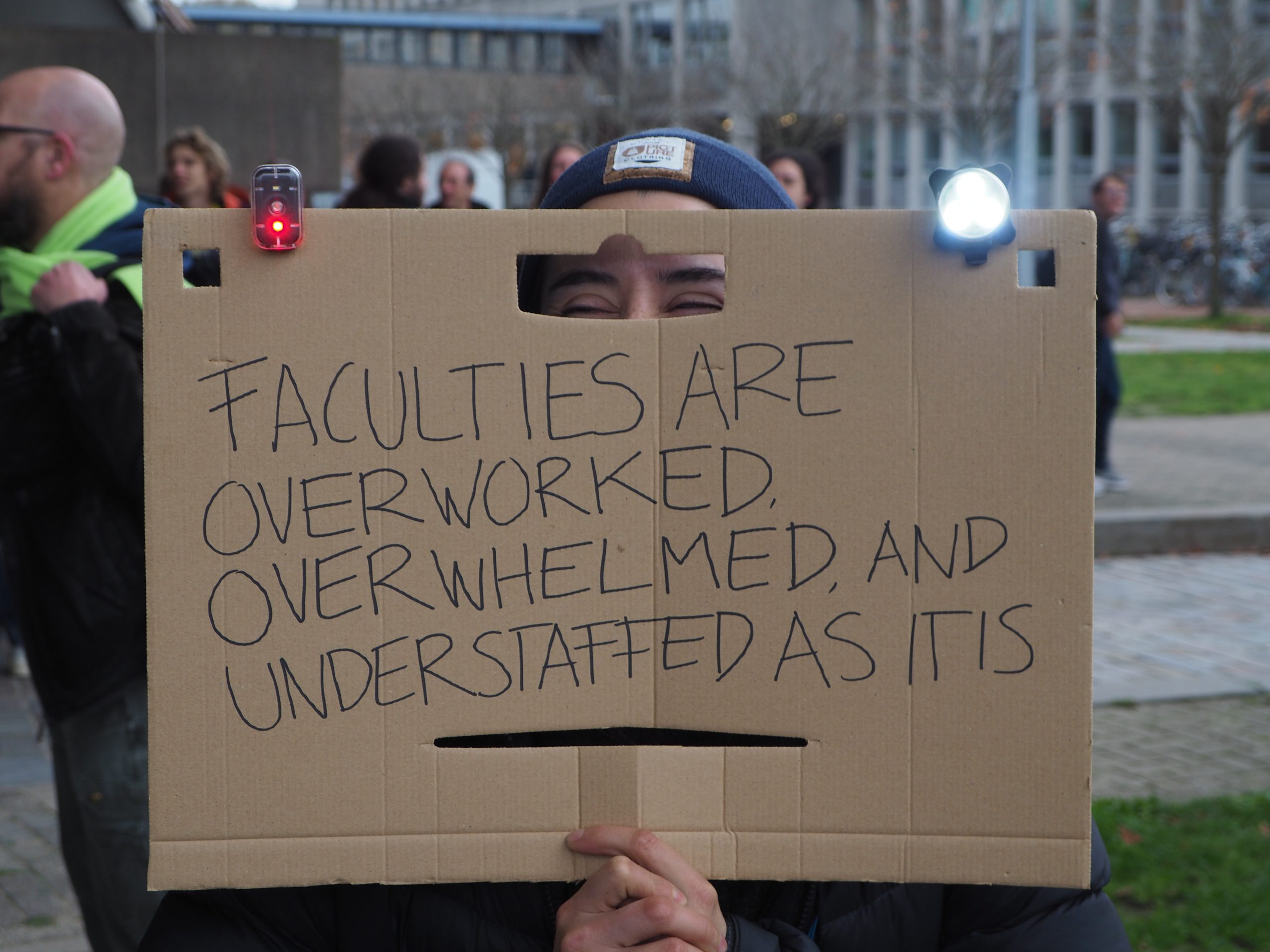The majority of the cuts in education and research can go ahead as planned, the deal on the budget for education, science and culture that was concluded Wednesday reveals. Of the 2 billion euros, a little shy of 700 million will be reversed.
Protest against education cuts on campus. (Photo: Jos Wassink)
In the past weeks, opposition parties and the coalition negotiated on the cuts in education and research. At first, D66 also participated, but in the end only CDA, ChristenUnie, SGP and JA21 remained.
The four coalition parties, PVV, VVD, NSC and BBB, did have to deliberate amongst themselves, because they don’t have a majority in the Senate and this threatened to be a stumbling block for the budget. The rest of the opposition is sure to vote against.
The long-term study penalty has been cancelled and the cutbacks on foreign students in depopulating areas will be decreased, but virtually all cuts in science will be upheld.
The details are yet to be announced, but it’s said that the only thing that will be ‘partially’ preserved are the starter grants for young scientists. These will probably be cut by 40 million euros less.
Public transport card
The bottom line is 748 million euros, but part of that is paid by the Ministry of Education, Culture and Science itself. The public transport card for students will become 75 million euros cheaper. This windfall will not benefit education itself, so it actually works out to a mitigation of 673 million euros.
The rest of the money will be pulled from other places, such as the Ministry of Health. One of the agreements is that medical specialists will start paying more for their refresher courses. That’s also education money, the universities feel.
Heaviest losses
Science suffers the heaviest losses in this deal, says Universities of the Netherlands. Research and higher education will still be cut by half a billion euros. “That’s very bad indeed for the future of the Netherlands”, says president Caspar van den Berg, “because knowledge is our most important raw material. What is good for our students, is that the long-term study penalty has been cancelled.”
The Dutch Student Union is also happy that “that ridiculous long-term study penalty” has been retracted, but criticises the rest of the cutbacks. “It won’t be a quiet spring for this government”, says chair Abdelkader Karbache. He’s predicting strikes.
The four opposition parties feel like they can defend their agreements. “We’ve made a bad budget less bad”, said Henri Bontenbal (CDA). Mirjam Bikker (ChristenUnie) says: “We support good policies and improve proposals where necessary, and this negotiation result is a good example of this. Chris Stoffer (SGP) thinks the budget has been considerably improved.
Other opposition parties don’t understand why these four parties didn’t drive a harder bargain. Luc Stultiens (GroenLinks-PvdA) calls the agreement a ‘historic blunder’.
Only D66 responds more mildly. “It’s good that CDA, JA21, CU and SGP have somewhat mitigated the cuts in education”, Rob Jetten writes on X. “Together we already managed to get rid of the slow-progress penalty.” But he pulled out for a reason and still thinks the cutbacks are excessive.
Geert Wilders (PVV), on the other hand, is “extremely happy” that the government can continue. “I’m relieved, because it was far from easy.”
Protests
In twelve cities, students and staff of higher education institutions protested against government policies. The protests were organised and supported by WOinActie and unions.
Some 50 TU Delft employees and students attended a protest co-organised by the VSSD in Delft. At Vrije Universiteit Amsterdam, a few hundred staff members and students formed a chain in front of the main building to protect education and research. A bike ride had been organised in Nijmegen and in Tilburg, Maastricht, Rotterdam and Groningen the cutbacks were met with disapproving whistles.
In Utrecht, professor and activist Ingrid Robeyns called for strikes. “Education is the backbone of a democratic society”, she is quoted on the DUB website. “These austerity measures will not only affect the quality of education and research but also the rule of law itself.”
HOP, Bas Belleman and Hein Cuppen
Translation: Taalcentrum-VU
Mitigated cuts:
| Measure | Structural |
| Teacher salaries | 75 million |
| Religious and ethical education | 19 million |
| Social services | 130 million |
| Religious heritage including churches | 5 million |
| Cancellation of long-term study penalty | 282 million |
| Regional higher educational (international students) | 125 million |
| Nationwide subsidies (practical learning and vocational and professional education segment transfer and connection schemes/technical senior general secondary education) | 32 million |
| Scientific research | 40 million |
| School and environment subsidy | 40 million |
| TOTAL | 748 million |
Do you have a question or comment about this article?
redactie@hogeronderwijspersbureau.nl


Comments are closed.